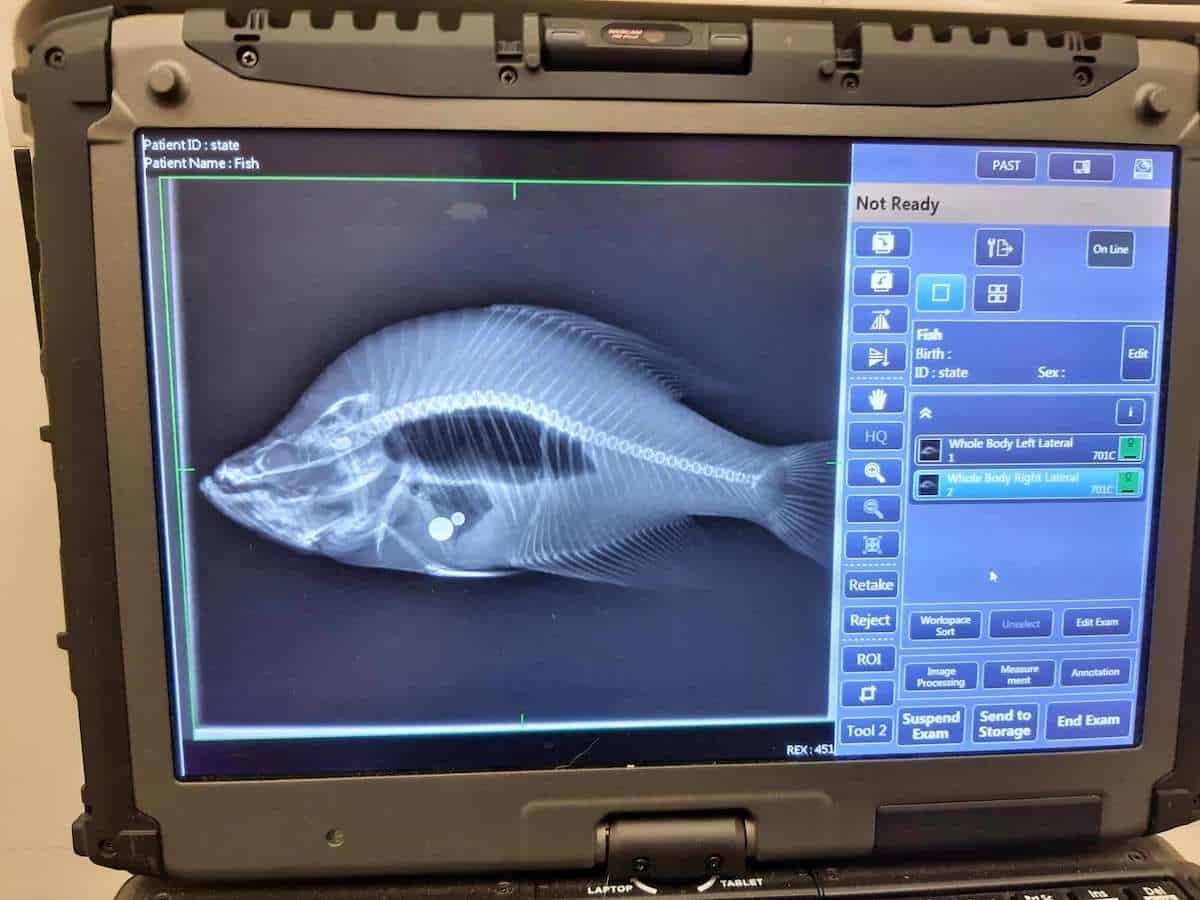Sure, we all “long arm” the occasional fish toward a camera to make it look bigger for Facebook.
But why do fishermen truly cheat? I mean, to the point of committing crimes in the public spotlight?
In the latest well-publicized case, the Kansas Department of Wildlife and Parks (KDWP) erased a man’s name from its state fishing records after receiving a tip that suddenly made the state white crappie record they certified last spring smell fishy.
Later in the year, investigators showed up at Bobby Parkhurst’s house with a warrant to seize the frozen fish, and X-rays clearly show a couple of metal ball bearings stuffed inside the carcass.
As the case first started getting national media attention in recent weeks, Parkhurst forcefully defended himself, posting on Facebook on February 3: “I caught that fish legally and honestly. … They have slandered my name. The officers are dishonest and should be held accountable.”
People initially commented in his support, but as of Tuesday morning, neither Parkhurst nor others had added new comments after KDPW released the evidentiary photographs, including the one published with this article. Parkhurst also had not removed the post by then.
I got an update on February 20 from Nadia Marji, KDWP’s Chief of Public Affairs, who said they considered this case closed. By policy, the agency sent the case to a county attorney for review. However, Marji does not anticipate further action beyond restoring Frank Miller’s 1964 state record for the 4.02-pound white crappie he caught in a Greenwood County farm pond.
“At this time, it does not appear this particular case will be tried,” Marji said in an email.
If prosecutors did make a case against Parkhurst, Marji wrote, it likely would be tried under the state statute for Making False Information (a nonperson felony).
While snagging a state record wins you bragging rights, that alone will not enrich anyone. I mean, who can even name the anglers who caught the world record black and white crappies?
Money is often the motive behind other major fishing scandals.
For example, remember the two guys caught stuffing weights into fish at the Lake Erie Walleye Trail tournament in 2022?
Both men, Jacob Runyan of Ohio and Chase Cominsky of Pennsylvania, ended up pleading guilty to felonies and misdemeanors related to cheating at the tournament while trying to win over $28,000 in prize money. Cominsky also forfeited the $130,000 boat the men used at the tournament, and both men spent time in jail, were put on probation, and levied fines.
Their attorney said the men also were unofficially sentenced to “endless public humiliation. … “When they get Googled, this case is gonna show up forever,” according to a 2023 news article in USA Today.
As it turns out, Cominsky also appears to be a serial deer poacher in Pennsylvania, where he has been prosecuted and lost hunting privileges, according to the Akron Beacon Journal newspaper.
Even while the ink was practically still drying on sentencing documents for the Ohio duo sentenced last spring, the director of a different Lake Erie tournament reported that a New York competitor had stuffed his walleye with smaller fish in an alleged attempt to illegally boost his bag limit’s weight to try to win prizes. A fishing trip to Panama valued at $14,500 was among the bounty.
Perhaps that competitor didn’t realize that the Bart’s Cove Walleye Duel tournament director, Mark Mohr, would cut open the submitted fish to ensure no one was trying to the same scheme as the Ohio cheaters.
Mohr said his inspection found a whole white perch and part of a small walleye inside the larger fish. It didn’t go well.
“The 12-inch walleye, it looked to me like they tried to stuff it, and it wouldn’t go down, so they cut the last three inches off,” Mohr told Outdoor Life last summer. “It was suspicious because the (smaller) fish was still really bright, and then I picked it up and could see a hook mark in its lip.”
Unfortunately, scamming fishing tournaments isn’t a new thing.
Take, for example, the guys who brought their own lunkers in live wells to a circuit of high-dollar bass fishing tournaments in Texas in the 1980s. They racked up about $350,000 (a cool million today) in “winnings” before authorities reeled them in.
Related articles on our website:

